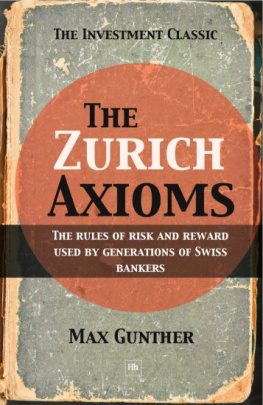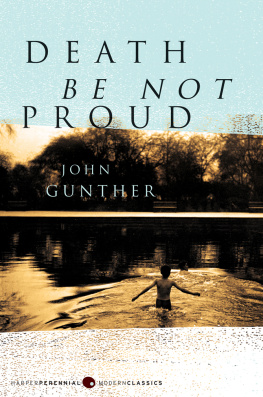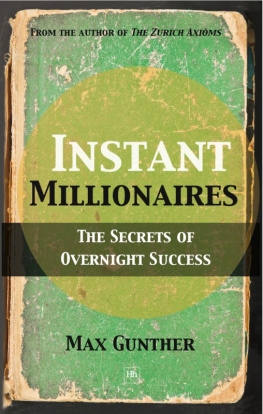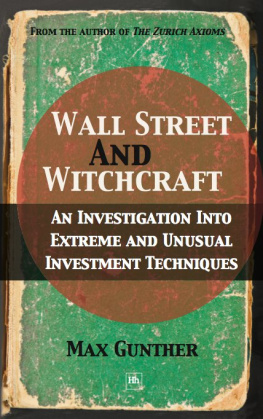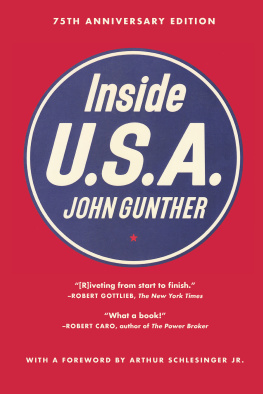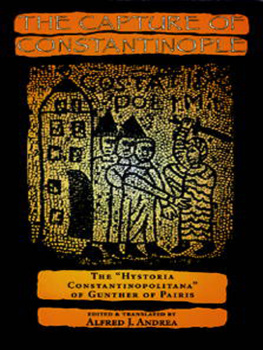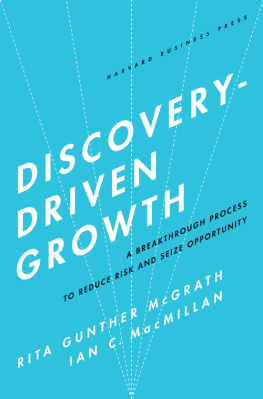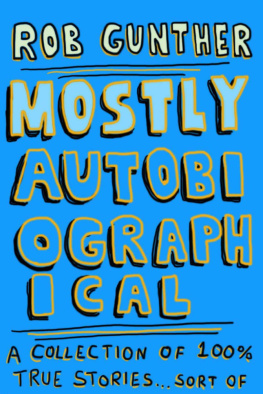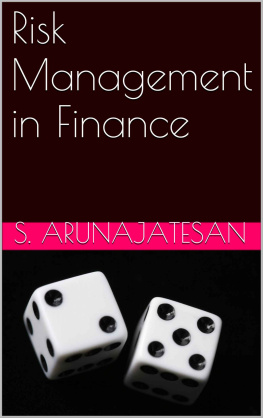Gunther - The Zurich axioms : rules of risk and reward used by generations of Swiss bankers
Here you can read online Gunther - The Zurich axioms : rules of risk and reward used by generations of Swiss bankers full text of the book (entire story) in english for free. Download pdf and epub, get meaning, cover and reviews about this ebook. year: 2004, publisher: Harriman House Ltd, genre: History. Description of the work, (preface) as well as reviews are available. Best literature library LitArk.com created for fans of good reading and offers a wide selection of genres:
Romance novel
Science fiction
Adventure
Detective
Science
History
Home and family
Prose
Art
Politics
Computer
Non-fiction
Religion
Business
Children
Humor
Choose a favorite category and find really read worthwhile books. Enjoy immersion in the world of imagination, feel the emotions of the characters or learn something new for yourself, make an fascinating discovery.
The Zurich axioms : rules of risk and reward used by generations of Swiss bankers: summary, description and annotation
We offer to read an annotation, description, summary or preface (depends on what the author of the book "The Zurich axioms : rules of risk and reward used by generations of Swiss bankers" wrote himself). If you haven't found the necessary information about the book — write in the comments, we will try to find it.
The Zurich axioms : rules of risk and reward used by generations of Swiss bankers — read online for free the complete book (whole text) full work
Below is the text of the book, divided by pages. System saving the place of the last page read, allows you to conveniently read the book "The Zurich axioms : rules of risk and reward used by generations of Swiss bankers" online for free, without having to search again every time where you left off. Put a bookmark, and you can go to the page where you finished reading at any time.
Font size:
Interval:
Bookmark:

HARRIMAN HOUSE LTD
3A Penns Road
Petersfield
Hampshire
GU32 2EW
UNITED KINGDOM
Tel: +44 (0)1730 233870
Fax: +44 (0)1730 233880
email: enquiries@harriman-house.com
website: www.harriman-house.com
First published in the United States of America by New American Library.
This edition was published in 2004 by Harriman House, for sale outside the United Kingdom and British Commonwealth Countries.
ISBN: 978-1-906659-94-3
Copyright Harriman House 2004. All rights reserved. Except as permitted under the United States Copyright Act of 1976, no part of this publication may be reproduced or distributed in any form or by any means, or stored in a database or data retrieval system, without the prior written permission of the Publisher. Moreover, this book may not be lent, resold, hired out or otherwise disposed of by way of trade in any form of binding or cover other than that in which it is published without the prior written consent of the Publisher.
Consider the puzzle of Switzerland. This ancestral home of mine is a rocky little place about half the size of Maine. It has not one inch of seacoast. It is one of the most mineral-poor lands on earth. It possesses not a drop of oil to call its own, barely a bucket of coal. As for farming, its climate and topography are inhospitable to just about everything.
It has stayed out of European wars for 300 years; chiefly because, in all that time, there has never been an invader who really wanted it.
Yet the Swiss are among the most affluent people in the world. In per capita income they rank with the Americans; West Germans; and Japanese. Their currency is among the worlds soundest.
How do the Swiss do it?
They do it by being the worlds cleverest investors, speculators, and gamblers.
This book is about betting to win.
Perhaps that makes it sound like a book for everybody. It is not. Everybody wants to win, of course. But not everybody wants to bet, and therein lies a difference of the greatest magnitude.
Many people, probably most, want to win without betting. That is an entirely understandable wish. There is nothing reprehensible about it. Indeed, many of our hoariest old Work Ethic teachings urge it upon us. We are told that risk-taking is foolish. A prudent man or woman places no bets beyond those that are required by the unalterable basic terms of human existence. The well-lived life is a nose-to-the-grindstone life, perhaps somewhat dull but safe. A bird in the hand...
Well, everybody understands the trade-offs. If you have a philosophical bias against betting, you will find little that is useful to you in this book unless, of course, it changes your mind.
But if you do not mind taking reasonable risks or better, if you enjoy risk, as the Swiss do then this book is for you. The Zurich Axioms are all about risk and its management. If you study the Axioms with the diligence they deserve, they can enable you to win more of your bets than you ever thought possible.
Lets not mince words. They can make you rich.
The book is about betting in its broadest sense. You will find the stock market mentioned frequently because that is where most of my experience has been, but the book is not limited to that great supermarket of dreams. The Axioms apply as well to speculation in commodities, precious metals, art or antiques; to gambles in real estate; to the thrust and parry of daily business; to casino and table gambling. The Axioms apply, in short, to any situation in which you put money at risk in order to get more money.
All of life is a gamble, as every adult knows. Many people, probably most, are unhappy with this fact and spend their lives figuring out how to place as few bets as possible. Others, however, take the opposite route, and among these are the Swiss.
Not all Swiss men and women display this trait, of course, but large numbers do enough, certainly, to allow for generalisations about the Swiss national character. The Swiss did not become the worlds bankers by sitting in dark rooms chewing their fingernails. They did it by facing risk head-on and figuring out how to manage it.
The Swiss, amid their mountains, look around at the world and find it full of risk. They know it is possible to cut ones personal risks to a minimum but they also know that if you do that, you abandon all hope of becoming anything but a face in the crowd.
To make any kind of gain in life a gain of wealth, personal stature, whatever you define as gain you must place some of your material and/or emotional capital at risk. You must make a commitment of money, time, love, something. That is the law of the universe. Except by blind chance, it cannot be circumvented. No creature on earth is excused from obedience to this pitiless law. To become a butterfly, a caterpillar must grow fat; and to grow fat, it must venture out where birds are. There are no appeals. It is the law.
The Swiss, observing all this, conclude that the sensible way to conduct ones life is not to shun risk but to expose oneself to it deliberately. To join the game; to bet. But not in the caterpillars mindless way. To bet, instead, with care and thought. To bet in such a way that large gains are more likely than large losses. To bet and win.
Can this be done? Indeed. There is a formula for doing it. Or perhaps formula is the wrong word, since it suggests mechanical actions and a lack of choice. A better word might be philosophy. This formula or philosophy consists of twelve profound and mysterious rules of risk-taking called the Zurich Axioms.
Be warned: the Axioms are somewhat startling when you first encounter them. They are not the kind of investment advice most counselors hand out. Indeed, they contradict some of the most cherished clichs of the investment-advice business.
The most successful Swiss speculators pay scant attention to conventional investment advice. They have a better way.
The term Zurich Axioms was coined by a club of Swiss stock and commodity plungers who collected around Wall Street after the Second World War. My father was one of the founding members. It wasnt a formal club. There were no by-laws, dues, or membership lists. It was simply a group of men and women who liked each other, wanted to get rich, and shared the belief that nobody ever got rich on a salary. They met irregularly at Oscars Delmonico and other Wall Street watering places. The meetings continued all through the 1950s, 1960s, and 1970s.
They talked about many things, but mainly about risk. The work of codifying the Zurich Axioms got started when I asked my father a question he couldnt answer.
My father was a Swiss banker, Zurich-born and bred. The given names on his birth certificate were Franz Heinrich, but in America everybody called him Frank Henry. When he died a few years ago his obituaries made much of the fact that he had headed the New York branch of the Schweizerbankverein Zurichs financial colossus, the Swiss Bank Corporation. That job was important to him, but he once told me that what he really wanted engraved on his tombstone was this sentence: He gambled and won.
Frank Henry and I started to talk about speculation while I was in high school. He would look at my report card and grumble that the curriculum was incomplete. They dont teach you the thing you need most of all, he would say. Speculation. How to take risks and win. A boy growing up in America without knowing how to speculate why, thats like being in a gold mine without a shovel!
Font size:
Interval:
Bookmark:
Similar books «The Zurich axioms : rules of risk and reward used by generations of Swiss bankers»
Look at similar books to The Zurich axioms : rules of risk and reward used by generations of Swiss bankers. We have selected literature similar in name and meaning in the hope of providing readers with more options to find new, interesting, not yet read works.
Discussion, reviews of the book The Zurich axioms : rules of risk and reward used by generations of Swiss bankers and just readers' own opinions. Leave your comments, write what you think about the work, its meaning or the main characters. Specify what exactly you liked and what you didn't like, and why you think so.

